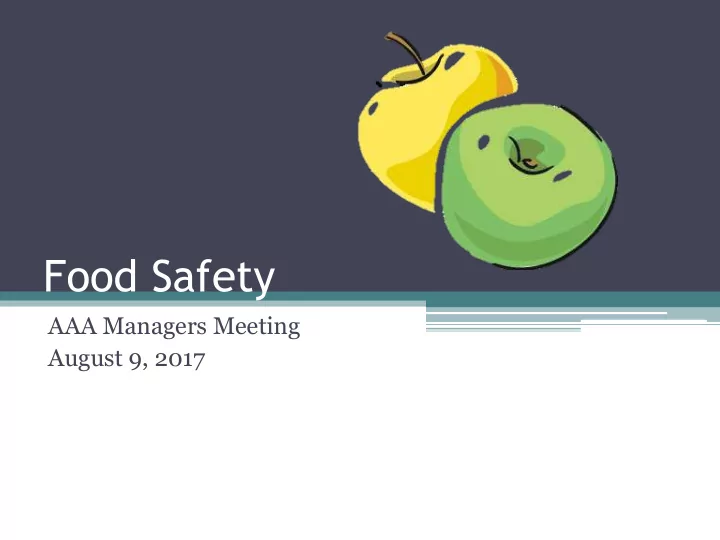

Food Safety AAA Managers Meeting August 9, 2017
Contamination
Types of Contamination • Biological • Chemical • Physical • Allergies
Biological Contamination E. Coli • Bacteria ▫ Lives in food ▫ Prevent by time and temp. control Noro Virus • Virus ▫ Carried by humans and animals ▫ Prevent through good personal hygiene (not killed by cooking) • Parasites Tape Worm ▫ Common in seafood, wild game, and vegetables ▫ Prevent by cooking foods to an appropriate temperatures and by purchasing from a reputable source
Allergens • Common Allergens : • Allergy Symptoms ▫ Milk ▫ Nausea ▫ Eggs ▫ Wheezing or shortness of breath ▫ Fish ▫ Hives or itchy rashes ▫ Wheat ▫ Swelling of body parts ▫ Soy Face, eyes, hands, & feet ▫ Peanuts ▫ Vomiting/diarrhea ▫ Shellfish ▫ Abdominal pain ▫ Tree nuts Label any foods containing common allergens for patrons.
Cleanliness
Good Hygiene Practices • Make sure employees DO: ▫ Wash hands ▫ Wear clean clothes ▫ Bathe regularly ▫ Wear gloves and hair nets • Make sure employees DON”T: ▫ Wear their aprons into the bathroom ▫ Use phones or other personal items in prep areas
Clean Kitchen • No spills on the ground • Kitchen smells clean • Clean lighting fixtures • Clean behind the stoves • Trash taken out routinely ▫ Kept Away from prep areas • Ice scoop kept OUTSIDE of ice bin ▫ In its own container ▫ Never use a glass to scoop out ice • Surfaces cleaned up between cooking different food items
Sanitizer Guidelines Chlorine Iodine Quats Water ≥100 °F ≥75 °F ≥68 °F ≥75 °F Temperature Per ≤5 or manufacturer's Water pH ≤10 ≤8 manufacturer's recommendation recommendation 50-99 Per Sanitizer Concentration 50-99 ppm ppm 12.5-25 ppm manufacturer’s recommendation Sanitizer ≥7 sec ≥7 sec ≥30 sec ≥30 sec Contact Time
Food Handling
Fundamentals of Storage • Food should be kept 6 inches off the ground • All containers need labels ▫ Rice, flour, beans, sugar, stored cooked food, etc. • Keep chemicals away from food • Rotate foods on a FIFO (first in first out) basis • Make sure there is also a thermometer in the dry good storage ▫ Keep temperature between 50°F and 70°F • Always keep soap and paper towels on hand • Make sure cleaning supplies are well stocked
Right into the Danger Zone • Pathogens grow best between 40°F and 135°F • Foods kept in this zone must be thrown out after 4 hours • As you walk by, check temperatures in the fridge, oven, and freezer
No Cooking Necessary Safe Cooler 145°F – 155°F Storage 145°F 145°F (Determined by internal 155°F cooking temps. ) 165°F
Find the Unsafe Storage Practices Hint: There are 11 things
Answers 1. Chemicals stored with food 2. Food stored on the floor 3. Boxes of food not labeled 4. Spilled food not cleaned up 5. Cooler door open 6. Overstocked cooler 7. Area not clean 8. Unlabeled items in cooler 9. Soup not covered 10. Chef not wearing gloves 11. Smoking a cigarette
Unsafe Storage Practices
Plans, Reports, and Records
Written Reports & Records • IHS Environmental Report • Menu Spreadsheet • Menu Substitution Form • Food Safety Records • Nutrition Education • AAA Monitoring Report • Emergency Food Plan Complete with Food ▫ Label food that is kept for emergencies • Food/Supply Inventory Records • Keep a list of everyone with known allergens • Master Cleaning Schedule ▫ What, Who, When, & How it should be cleaned
Inventory Sheet
Food Safety Records
Master Cleaning Schedule What Who When Supplies How Convection Prep Area Daily Brush 1. Take tray • Ovens • Dust pan off of top • Hot soapy of oven water 2. Wipe off • Clean top and towels outside of oven with hot soapy water Be sure to monitor the cleaning after the schedule has been made .
Thank you!
Recommend
More recommend